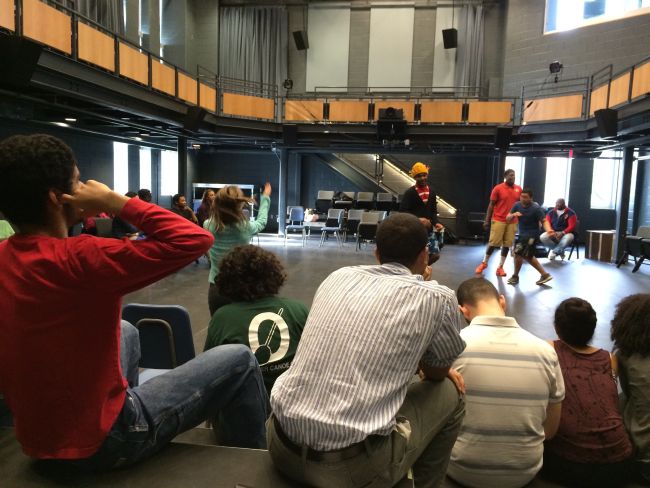Our M.I.P.A. Students
The M.I.P.A. students watch Mr. Gillespie’s 2nd period Theater class perform in the Black Box Theatre.
May 2, 2014
April was Autism Awareness month. This brought to light the fact that there are students with this disability in our school. This reporter wanted to find out more about our fellow students on the second floor of the C hallway.
The M.I.P.A. (Multi Interventional Program for students with Autism) program at Wakefield assists students who have been diagnosed with a neurological variation referred to as Autism. Autism has been found in about 1% of the population. Although autism varies wildly person-to-person, all cases of Autism share some common characteristics. “There’s a lack of communication and social skills,” explained Ms. Spencer, a 17-year veteran special education teacher; “Social cues” don’t ring up the same way they do in “typical” students. Being labeled as “autistic” comes with prejudice, and although “we would prefer not to label the kids” Ms. Spencer went on to explain, “Labels are necessary in order to get [assisted] services.”
The MIPA classroom has a slightly different feel than the average. Through the numerous times I visited the room, I observed that in the M.I.P.A. classroom the class materials are geared more toward life outside of school (finding jobs, social skills, basic arithmetic etc.), rather than the emphasis on math, science, English and history that I’ve experienced in classes. Walking into the classroom is a very refreshing experience, every time I’ve visited I’ve been greeted by name and with a smile; something you rarely experience in most settings.
During my time with the M.I.P.A. students I learned more about the students than I had expected. We talked about favorite foods, movies, books and sports teams. Every student had his or her favorite; one boy could recite any Dr. Seuss book, while another enjoyed the movie Frozen
Fridays are game days. Students play Wii bowling and Ms. Spencer claims that it’s near impossible to beat them, and they do it without moving more than their wrist. “Some are crazy good at video games” she explained, “their brains go so fast!”
These students have a greater impact on the community than most realize. One group of students assist in preparing lunches at Claremont while another does the same thing at Wakefield. There’s also a group that goes to Claremont and reads with the preschool children. The students also participate in track and swim at Wakefield. Ms. Spencer said that one student could even jump off the diving board and still manage not to get his hair wet. When asked every single one of the students agreed that they absolutely loved Wakefield (especially basketball games).
“There’s a misconception that [people with autism] aren’t smart” Ms. Spencer said, “they’re smart in a different way.” “They get it,” she continued to say, “They just get it in a different way.” Recall a time you were extremely frustrated, you probably wanted to vent right? “We can vent” Ms. Spencer explained, “They can’t.”
Her dedication is apparent by the amount of time we spent together, and the resources she shared. She printed out a fantastic article that described a young boy with autism who used lines from Disney movies to talk to his family. Apparently one of the students she worked with did a similar thing, she said that one day the student called two girls with blonde hair “Goldilocks” in an attempt to describe them to her. “They perseverate on things,” she explained saying that it’s easy to tell when one of the students is thinking very hard about one thing. This can often be misunderstood as disinterest in a conversation, it’s just them processing.
“They don’t hate anyone or anything,” said Ms. Spencer, “they’re very observant but don’t judge anyone.” “It is what it is,” she said smiling.
Ms. Spencer’s tone quickly changed, however, when she recalled an earlier experience that day. That morning one of her students had said good morning to one of the “so called normal kids” but the student walked by and completely ignored her. This was a perfect example of the type of prejudice people with autism experience everyday. “Who are you to treat another human being like that?” she demanded, “You’ll meet people who are different throughout your life, you can’t let labels fool you.”
Everyone needs to work on sensitivity, no matter who they are, everyone judges. There’s something to be said when it took an assigned project for me to talk to a group of people. As a community, we ought to work on it. Let’s try to say hi to people we see, and not be afraid to strike up a conversation with someone new! It’s just as important that we weed the r-word out of our vocabulary, “People who use the r-word ought to get their butt kicked,” said Ms. Spencer. It just doesn’t make sense!




